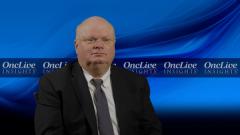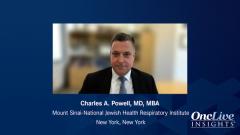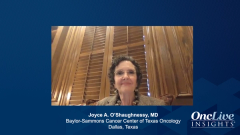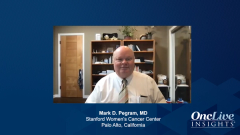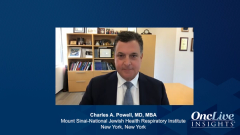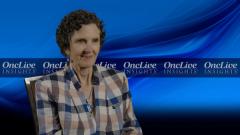
Difference in Breast Cancer Outcomes With Multidisciplinary Care
Shared insight on how nuanced multidisciplinary care can positively impact outcomes when treating a patient with breast cancer.
Episodes in this series

Joyce A. O’Shaughnessy, MD: The more expertise you can bring to the care of a woman or a man with breast cancer, the better their medical outcome as well as their holistic outcome. Patients appreciate that high-touch situation in the cancer center with multiple individuals looking out for them and talking to them. I forgot our exercise physiologists—we have exercise rooms and free exercise training information. The patient can go around in various places around the cancer center. I remember our patients, we have a center, which is for patient-support access to individual counseling, access to the support groups that may be useful, access to child life information, and so forth.
If the patient can go around the cancer center and go to all these places, if they can get a variety of support, it’s terrific for them. They can get things taken care of sooner rather than later. It can help them tolerate therapy. Patients can’t benefit from therapy unless they can tolerate the therapy and rehab from the therapy. Being able to get comorbidities taken care of, such as diabetes, nutrition, weight loss, and exercise, very substantially helps patients in terms of their quality of life but also for their longevity and remaining recurrence-free. I’m a big believer in that. But if you don’t have expert surgical care, radiation care, and pathology care, patients aren’t going to get the right diagnosis. They’re not going to get the right treatments. It’s critical to have a high level of expertise in many disciplines.
Mark D. Pegram, MD: It’s critical to have expertise from a variety of areas to get the best therapeutic outcome in the modern age. The various interventions for breast cancer are so nuanced based on randomized clinical trials. To keep up to date with all the unfolding information in real time is a challenge. It’s necessary to have specialization in different areas to keep track of all that literature so that you can make the best use of the most recent data sets in making a real time decision for a patient. It’s not infrequent that we’re using data from the latest ASCO [American Society of Clinical Oncology Annual Meeting], or from the latest San Antonio Breast Cancer Symposium, the latest Society of Surgical Oncology meeting, or the latest radiation therapy international conference. It’s typical that we’re using cutting-edge information. The pace of new treatments that have become available in breast cancer is at an all-time high right now. The only way you can keep pace and get the best outcomes with the latest cutting-edge information is to have an interdisciplinary team working on each individual case.
Charles A. Powell, MD, MBA: When care is delivered in a multidisciplinary fashion, the patient receives the benefit of access to exquisite specialty expertise for any issue they may encounter and having all those specialists bring that expertise together for their care. It’s impossible for 1 physician to have exquisite expertise across all the domains that may be relevant for a patient, particularly a patient with complicated cancer history, and particularly a patient with potential complications of cancer therapy. The ability to integrate across multiple disciplines and provide that exquisite level of detailed expertise to a single patient as a result of the communication between physicians elevates the quality of the patient-centered care. It’s ideal if it can be done within a single physical site, where a patient can see multiple specialists in a single visit to an ambulatory setting. Certainly it can be accomplished using visits to more than 1 ambulatory site if necessary, and it can be accomplished using a combination of on-site visits and remote visits guided by televideo visits. There are multiple ways to deliver a multidisciplinary approach, but the benefits are noticed by patients and noticed by providers who care for patients in a multidisciplinary setting.
Transcript Edited for Clarity


